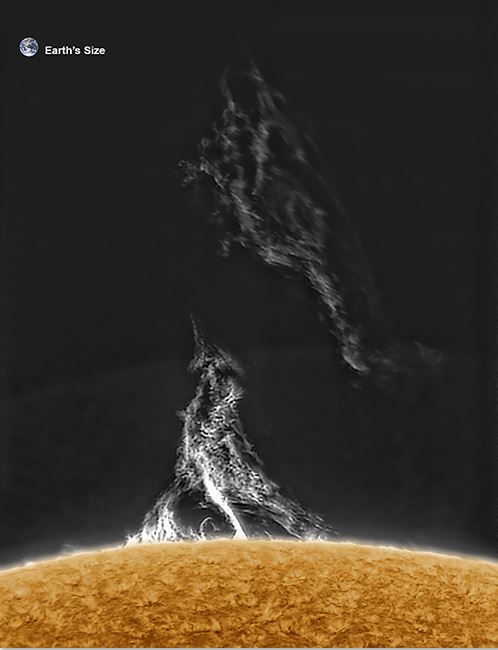Filipino doctor by day astronomer by night, Dr. Jett Aguilar gets his name on an asteroid
By: The Good News Pilipinas Team
|
Published on: February 10, 2022

Photos courtesy of DOST Philippines Office of the Secretary.
Filipino doctor by day and an amateur astronomer by night, Dr. Jose Francisco “Jett” Aguilar has been honored with an asteroid bearing his name.
“7431 Jettaguilar” is an 8-kilometer-wide asteroid circling the Sun between the orbits of Mars and Jupiter.
The Paris-based International Astronomical Union (IAU) officially named minor planet 1993 FN41 as “7431 Jettaguilar” in honor of Dr. Jose Francisco A. “Jett” Aguilar, a 60-year-old Filipino neurosurgeon at the Philippine Children’s Medical Center, Philippine General Hospital, and Cardinal Santos Medical Center.
Dr. Aguilar has been providing neurosurgical services to Filipino children for more than 20 years. His recent surgeries included the successful removal of a parasitic twin from a three-week-old infant boy, nicknamed “Baby Ned” in 2019. He is also the clinical director of the Philippine Movement Disorder Surgery Center which pioneered “Deep Brain Stimulation” surgery for Filipino patients afflicted with a rare genetic movement disorder called “X-Linked Dystonia Parkinsonism”.
Despite his busy medical practice, Dr. Aguilar has been an ardent astrophotographer for more than 15 years, and his photos of the Sun, the transit of Venus, lunar eclipses, and other celestial events taken from his private home observatory in Quezon City have been published in Spaceweather.com and Skyandtelescope.org.
He is also an avid eclipse chaser, and he has traveled overseas with members of the ALP to observe and photograph total and annular solar eclipses in China, Indonesia, the U.S., and Singapore.
The Asteroid 7431 Jettaguilar revolves around the Sun at an average distance of about 463 million kilometers and takes it about 5.4 years to complete one orbit. It is currently about 643 million kilometers from Earth, shining very dimly at magnitude 19.5 in the constellation Sagittarius. One would need a fairly large telescope and sensitive CCD camera to record its faint, star-like image.
Asteroids are small, rocky bodies left over from the birth of our solar system about 4.6 billion years ago. They reside mostly in the Main Asteroid Belt and can range in size from boulders to minor planets nearly 1,000 kilometers across.
Unlike comets, which are usually named after their discoverers, for centuries asteroids have been traditionally named after mythological figures and geographical places, as well as renowned scientists, explorers, poets, composers, novelists, and other prominent personalities.

This towering eruption of hot, ionized gas on the surface of the Sun, called a “solar prominence,” was captured by Dr. Jett Aguilar on May 16, 2015, from his home observatory in Quezon City using a 100-millimeter Lunt hydrogen-alpha telescope. Photo courtesy of DOST
Joson and Aguirre proposed the naming of the asteroid to the IAU to recognize Dr. Aguilar’s contributions to the medical field and Philippine astronomy. The citation they prepared, which was published in the IAU’s WGSBN Bulletin in 2021, reads:
Jose A. “Jett” Aguilar (b. 1961) is a Filipino neurosurgeon who has saved over one thousand children in the Philippines by volunteering his time and surgical expertise to treat their congenital malformations and brain tumors. He is also an amateur astronomer and serves as vice president of the Astronomical League of the Philippines.
According to the WGSBN Bulletin, asteroid 7431 Jettaguilar was discovered on March 19, 1993, from the European Southern Observatory in La Silla, Chile, and was given the preliminary designation 1993 FN41.
The IAU’s 15-member Working Group for Small Bodies Nomenclature (WGSBN) is the sole scientific organization with the authority and responsibility of assigning names to small solar system bodies such as asteroids, comets, and the satellites of minor planets.
In 2019, top U.S. school MIT named 3 minor planets after award-winning Filipino students from Camarines Sur.
TELL US your good news story tips by messaging GoodNewsPilipinas.com on Facebook, Twitter, Instagram, or e-mail editor@goodnewspilipinas-com-256437.hostingersite.com and WATCH Good News Pilipinas TV YouTube for more Filipino Pride stories!
